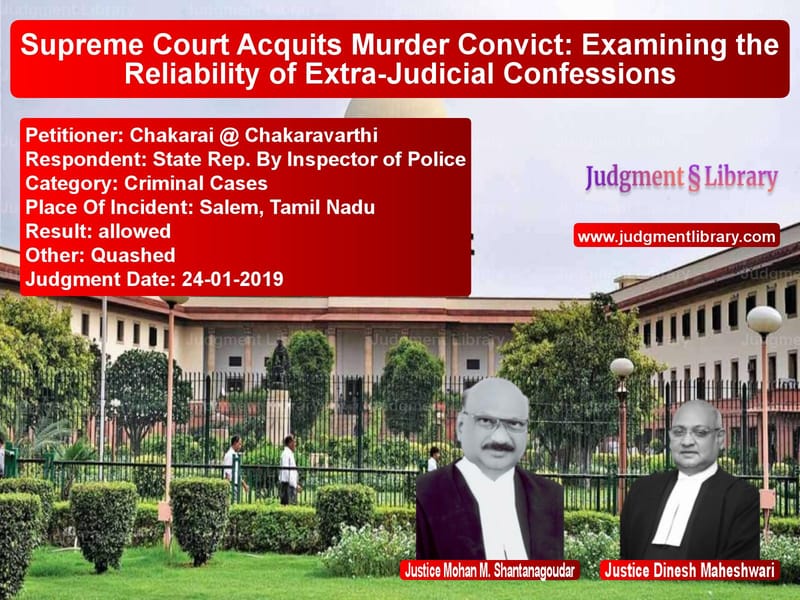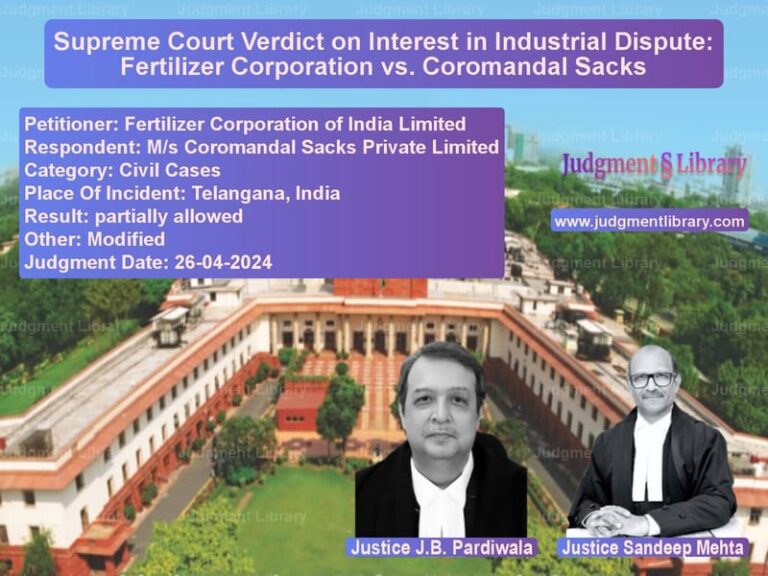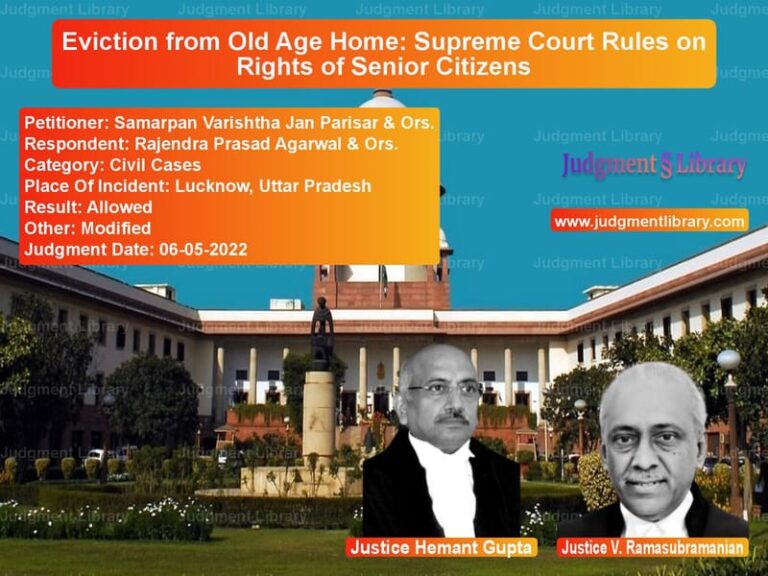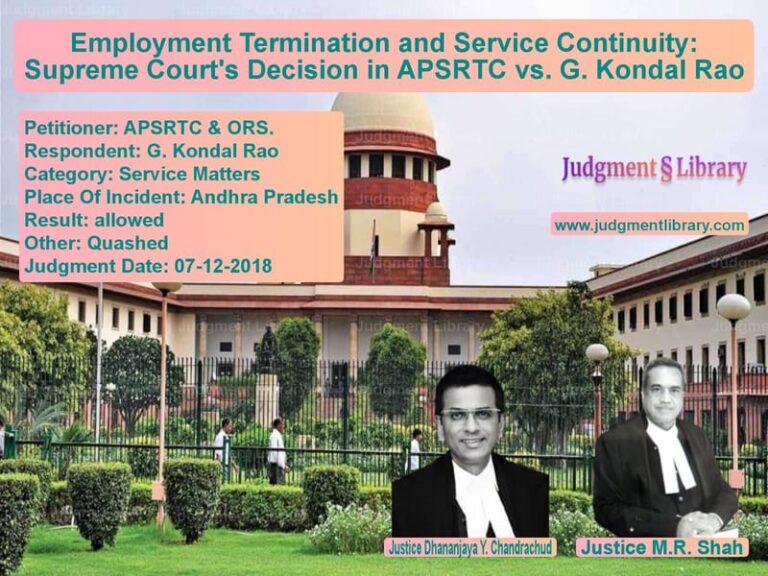Supreme Court Acquits Murder Convict: Examining the Reliability of Extra-Judicial Confessions
The Supreme Court of India recently overturned the conviction of an accused in a murder case, highlighting the unreliability of extra-judicial confessions as the sole basis for conviction. The case, Chakarai @ Chakaravarthi vs. State Rep. By Inspector of Police, centered around whether an extra-judicial confession could sustain a conviction when other crucial evidence was lacking. The verdict provides critical insights into the judicial approach towards such confessions and reaffirms the principle that convictions must be based on unimpeachable evidence.
Background of the Case
The case involved the murder of Ramamurthy, a collection agent working for New Centurion Bank in Salem, Tamil Nadu. The accused, Chakarai @ Chakaravarthi, along with another accused, had taken vehicle loans from the bank but failed to repay them. Ramamurthy exerted pressure on them to settle their dues, even going to the extent of seizing their vehicles to force repayment.
According to the prosecution, the accused harbored deep resentment against the victim and conspired to eliminate him. On May 14, 2005, the accused allegedly lured Ramamurthy to a location under the pretext of repaying the loans. Once he arrived, he was forcibly abducted in a Maruti van and later murdered. His body was found dumped near the house of an advocate in Salem.
Petitioner’s Arguments
- The defense contended that the prosecution’s case relied almost entirely on an extra-judicial confession made to a Tahsildar (P.W.12), which is inherently weak evidence.
- The alleged eyewitnesses to the abduction (P.W.8) and the conspiracy (P.W.11) had turned hostile, casting doubt on the prosecution’s claims.
- The motive was weak, as the dispute over vehicle loans had occurred six months prior to the incident, making it unlikely that it would have led to murder.
- The forensic evidence was flawed, with discrepancies in the serial numbers of requisitioned reports and the serological findings.
Respondent’s Arguments
- The prosecution asserted that the extra-judicial confession was voluntary and detailed, making it a credible piece of evidence.
- It was argued that the motive was strong, given that the deceased had caused financial distress to the accused.
- The recovery of blood-stained clothes and the murder weapon from the accused’s possession further corroborated the prosecution’s case.
Supreme Court’s Judgment
The Supreme Court, led by Justice Mohan M. Shantanagoudar, scrutinized the evidence and concluded that the conviction was unsustainable for the following reasons:
- Unreliability of Extra-Judicial Confessions: The Court noted that extra-judicial confessions are inherently weak evidence and must be corroborated by independent material. In this case, there was no corroborative evidence.
- Hostile Witnesses: Key witnesses, including the one who allegedly saw the abduction, turned hostile, making the prosecution’s version doubtful.
- Flawed Forensic Evidence: The prosecution failed to present a conclusive forensic report matching the blood found on the accused’s clothing with that of the deceased.
- Lack of Motive: The alleged financial dispute was six months old, making it improbable that the accused would resort to murder.
Observations from the Judgment
The Court referred to Thangavelu vs. State of Tamil Nadu, where a similar extra-judicial confession was deemed fabricated. The Court emphasized:
“At this juncture we may take note of the prosecution case that the appellant had made an extra-judicial confession… This confession is so full of facts and graphically details what happened over years. In a manner of speaking, if this confession is true, the appellant had the foresight to guess as to who the prosecution witnesses were going to be, which gives an impression that the prosecution attempted to create evidence.”
Applying the same reasoning, the Supreme Court found that the confession in this case was too detailed and suspiciously self-incriminating.
Conclusion
The Supreme Court’s verdict underscores the principle that extra-judicial confessions alone cannot form the basis of a conviction. The ruling highlights the necessity of corroboration and the need for solid forensic and circumstantial evidence in criminal trials. The judgment sets an important precedent, ensuring that courts rely on unimpeachable evidence rather than confessions that may be extracted under coercion or fabricated.
Petitioner Name: Chakarai @ Chakaravarthi.Respondent Name: State Rep. By Inspector of Police.Judgment By: Justice Mohan M. Shantanagoudar, Justice Dinesh Maheshwari.Place Of Incident: Salem, Tamil Nadu.Judgment Date: 24-01-2019.
Don’t miss out on the full details! Download the complete judgment in PDF format below and gain valuable insights instantly!
Download Judgment: Chakarai @ Chakarava vs State Rep. By Inspec Supreme Court of India Judgment Dated 24-01-2019.pdf
Direct Downlaod Judgment: Direct downlaod this Judgment
See all petitions in Murder Cases
See all petitions in Bail and Anticipatory Bail
See all petitions in Judgment by Mohan M. Shantanagoudar
See all petitions in Judgment by Dinesh Maheshwari
See all petitions in allowed
See all petitions in Quashed
See all petitions in supreme court of India judgments January 2019
See all petitions in 2019 judgments
See all posts in Criminal Cases Category
See all allowed petitions in Criminal Cases Category
See all Dismissed petitions in Criminal Cases Category
See all partially allowed petitions in Criminal Cases Category







